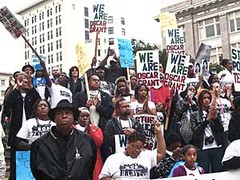
A demonstration in Oakland demanding justice for Oscar Grant who was killed by BART Police in 2009. Grant's killing sparked outrage in Calif. and throughout the country. (Photo: Judy Greenspan)
Originally uploaded by Pan-African News Wire File Photos
By Gene Clancy
Published Nov 11, 2010 9:05 PM
“I voted for Obama because I felt his message and wanted to be a part of a change in America. This year it’s different. All the confusion with the Tea Party, all the negativity against the president and the Republicans who want to take back their country, all my hope is gone,” said Brian Henderson, a 22-year-old Washington, D.C., resident. “But I’m still going to vote and encourage others to do so also. It’s hard to get excited when you don’t feel like the options are any better than the devil and Satan in some places.” (finalcall.com, Nov. 1)
This was the opinion expressed by many young Black people shortly before the recent elections, which saw the defeat of many Democratic politicians across the country. Black youth, responding to a national survey of 15- to 25-year-olds, revealed that they were realistic about the meaning of the new age of hope President Barack Obama had promised in 2008.
“This group of young people, although exuberant over the first African-American president, realize that they cannot count on him or any other politician to singly change their condition,” said Cathy Cohen, University of Chicago professor of political science and lead researcher of the Black Youth Project study.
In their conversations, Black youth repeatedly pointed to the need for community action — also part of Obama’s campaign message — as the vehicle for change.
Although there has been no detailed analysis of the 2010 midterm elections yet, exit polls conducted by various news organizations point to a low turnout by youth, as well as Black and Latino/a voters. A CBS News poll conducted the day of the election reported that African Americans were only 10 percent of the voters, down from 13 percent in 2010. Youth 18 to 29 years old made up only 9 percent of voters in 2010, down from 19 percent in 2008.
Most of these polls are vague at best and may very well be misleading. For example, they do not specify whether the percentages cited are registered voters, people qualified to vote (excluding prisoners, immigrants and many others), or just totals of people within certain age groups.
Nevertheless, it is almost certain that the apparent victories of Republican and other right-wing candidates were due to low voter turnout and demoralization on the part of progressives and working-class voters rather than to their endorsement of conservative policies and candidates.
Perhaps the most telling statistic is that only 41.1 percent of all the eligible people in the U.S. voted. This would be astonishing, were it not for the fact that it is ordinary: Voter turnout in the past six midterm elections has ranged between 38 percent and 42 percent. Considering that almost no candidate won by more than 55 percent in the recent elections, the so-called “repudiation” of Obama being trumpeted by the mainstream media represents a “mandate” of only 24 percent of the U.S. electorate.
Why don’t people vote?
Dissatisfaction with elected officials is at an all-time high in the United States. Polls have found that only 11 percent of people in the U.S. have faith in Congress; 45 percent favor replacing them by picking names out of the phone book! (Rasmussen Reports, January 2010) The Tea Party and other groups on the extreme right have tried to channel these feelings into a rightward, even fascist direction. But the truth about nonvoting lies elsewhere.
It has become popular in the mainstream media to associate low voter turnout with “voter apathy.” This implies that people who don’t vote really don’t care about politics or about who is elected to office. This patronizing view is behind the exhortation made by bourgeois pundits before every election: “If you don’t vote, you can’t complain!”
In a recent article in Psychology Today, Guy Winch attributes poor voter turnout and other examples of so-called political apathy to a phenomenon called learned helplessness. “Learned helplessness,” according to Winch, “is a psychological state that describes what happens when people believe they have no control over their environment. When we become convinced our actions will not have the impact we desire, we cease our efforts and become passive and helpless.” People complain, but they don’t do anything about it because they are convinced it won’t do any good. (Oct. 26)
The masses of people are not stupid or ignorant, as many would like to make them out to be. Beaten down by exploitation and oppression, they have learned through bitter experience that it seldom makes any difference to their daily lives who is in office. Third party candidates who might offer a real choice are systematically prevented from gaining ballot status, or from publicizing their issues.
As the fightback develops against capitalist misery, people will be voting with their feet, their lungs and their solidarity.
--------------------------------------------------------------------------------
Articles copyright 1995-2010 Workers World. Verbatim copying and distribution of this entire article is permitted in any medium without royalty provided this notice is preserved.
Workers World, 55 W. 17 St., NY, NY 10011
Email: ww@workers.org
Subscribe wwnews-subscribe@workersworld.net
Support independent news DONATE
No comments:
Post a Comment